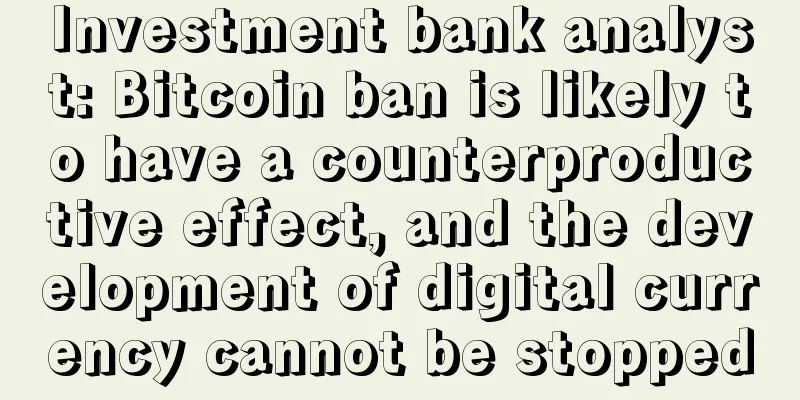Investment bank analyst: Bitcoin ban is likely to have a counterproductive effect, and the development of digital currency cannot be stopped

|
Investment bank Needham & Company LLC recently published a commentary on the article "Economic and financial turmoil contributes to the popularity of Bitcoin", discussing several major factors that promote the development and popularity of Bitcoin, including capital controls, banknote abolition, hyperinflation, and even Bitcoin bans. Some of these factors may seem negative at first glance, but Needham believes that they will eventually bring more popularity to Bitcoin, thereby promoting the popularity of this digital currency. Needham is a nationally recognized investment bank and asset management firm serving growing companies. Since its founding, Needham has successfully led and financed more than 785 public offerings. Bitcoin ban fails to achieve desired effectNeedham analyst Spencer Bogart explained that certain countries will ban Bitcoin or implement strict regulatory policies.
He added:
Taking Bangladesh as an example, Bogart pointed out that the country's central bank issued a Bitcoin ban in September 2014, and any "suspect" who uses and holds Bitcoin will face up to 12 years in prison. However, judging from the Internet search volume, the country suddenly became the world's most Bitcoin-focused country in 2016, ranking 7th.
Similarly, after the ban on Bitcoin in 2014, Bitcoin searches in Bolivia surged, second only to Bangladesh. The Streisand effect is a plausible explanation for the phenomenon Bogart describes. Censorship is often counterproductive. The more you try to prevent people from hearing about something, the more they will want to find out the truth. The popularity of Bitcoin also depends on these factorsOther factors Bogart mentioned as driving Bitcoin adoption include capital controls, demonetization, and hyperinflation. For example, India began to implement the demonetization policy in November last year. Since then, Bitcoin searches and transactions have increased rapidly, and Bitcoin usage has increased threefold. Nigeria’s inflation rate doubled in a year, and with it, “there has been an increase in Bitcoin searches in the country.” In addition, Venezuela’s hyperinflation (180%+) has seriously harmed its economy, and people are paying more and more attention to Bitcoin, and trading volume has also increased. He concluded:
Although many countries prohibit the use of Bitcoin, many countries also strongly support this technology. The Swiss Railways has launched a Bitcoin service, where consumers can use Swiss francs to purchase Bitcoin through ticket machines at stations. There are more than 1,000 such ticket machines across the country. The Swiss town of Zug also supports the use of Bitcoin to pay for public services. In addition, Bogart said that Switzerland also plans to issue a "crypto bank" license, which aims to "create a new category of financial institutions that can handle cryptocurrency businesses such as Bitcoin." According to online search volume, Americans' interest in Bitcoin lags behind even 20 other countries.
Caracas (the capital of Venezuela), Kuala Lumpur (the capital of Malaysia), Sandton (South Africa) and Lagos (the capital of Nigeria) all have much more interest in Bitcoin than San Francisco and New York. |
>>: Bitcoin Could Take Over a Trillion-Dollar Market? Really?
Recommend
Li’an Technology Releases Bitcoin and Litecoin Dual Mining Chip SF3301
On June 27, 2015, Li'an Technology released t...
Staking mechanism: Filecoin Space Race pledges 2 million FIL
As of 11:00 on August 30, the current block heigh...
Alibaba Cloud Entrepreneurs Program Receives RMB 3,500 Cloud Server Discount for Free
As a leading cloud computing service provider in ...
Moles reveal which women are most likely to bring good luck to their husbands
The moles on our bodies can bring us good luck or...
People with a lack of wisdom have a hard time succeeding and low IQs lead to nothing.
IQ is very important to everyone and can even det...
Nasal lines analyze your marriage and personality
Nasal lines analyze your marriage and personality...
Bottom out and rebound | Mining machine market released in the 4th week of July
The computing power is gradually recovering. Duri...
A movie that may give a profound understanding of the Bitcoin industry
On the afternoon of March 6, 2016, the Bitcoin-th...
How does a girl with a high nose look like?
Physiognomy is a discipline with a long history. ...
What is the broken palm line? Palmistry analysis
Judging from palmistry, everyone has different li...
What kind of people are least good at financial management?
What kind of people with this kind of palm lines ...
What kind of boss is difficult to get along with?
As the saying goes: Appearance reflects the heart...
It is meaningless to be judged by Vitalik Buterin. Does ApeCoin have any value?
On March 17, 2022, Yuga Labs, the owner of the Bo...
What does it mean when someone is unlucky? I hope it's not you.
Everyone hopes to have a good life and be success...









